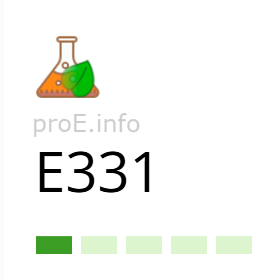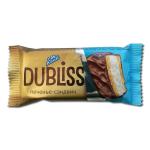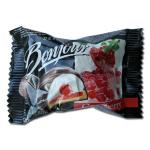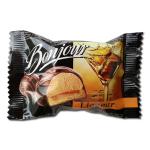
Other names for the additive (synonyms)
General Information
Sodium citrate (lat. Natrii citras) is the sodium salt of citric acid, used in the food industry as the food additive E331. Sodium citrate functions as an emulsifier or stabilizer and is classified as an antioxidant. It is also used as a seasoning that enhances the taste of food products (due to the sour-salty flavor of E331, it is sometimes referred to as "sour salt"). Another function of stabilizer E331 is to regulate the acidity of various dishes (especially gelatin-based desserts), as well as to adjust acidity levels in coffee machines.
Sodium citrate was first used in 1914 during blood transfusions as an anticoagulant. Later, it began to be used in the food industry in liquid form.
Today, sodium citrate is produced industrially by neutralizing citric acid with a sodium source (such as sodium hydroxide), followed by crystallization.
Three types of sodium citrate are used in industry, each corresponding to a subtype of the food additive E331, indicated by Roman numeral suffixes:
- Additive E331(i) – monosodium citrate, either anhydrous or monohydrate. Chemical formula: NaC6H6O7;
- Additive E331(ii) – disodium citrate (hydrate). Chemical formula: Na2C6H6O7∙1.5∙H2O;
- Additive E331(iii) – trisodium citrate, either anhydrous or hydrate. Chemical formula: Na3C6H6O7.
The most commonly used form is disodium citrate dihydrate, which has a higher concentration of active substance and offers good long-term storage stability.
The food additive E331 dissolves well in water, is non-flammable, non-explosive, non-toxic, and does not irritate the skin. However, inhaling sodium citrate powder may cause irritation of the upper respiratory tract.
Key characteristics of food additive E331:
- Taste – specific, sour-salty.
- Color – white.
- Odor – none.
- Consistency – fine crystalline powder.
Effects on the Body
Benefits of Additive E331
Outside the food industry, sodium citrate is often used as a medicinal product to treat cystitis and stabilize blood. It helps reduce heartburn and alleviate hangover symptoms.
Sodium citrates are naturally present in the human body, where they are involved in metabolic processes and provide energy to cells. As an antioxidant, food additive E331 protects cell membranes from free radical damage.
Additionally, sodium citrate can relieve heartburn and reduce the effects of a hangover.
A number of studies have shown that sodium citrate can delay muscle fatigue and improve athletic performance in both high-intensity and resistance exercises. This effect is associated with the prevention of lactate accumulation in the muscles.
Risks of Additive E331
The food additive E331 may have some adverse effects on the body. When used in medications, sodium citrate may cause the following side effects:
- increased blood pressure,
- reduced appetite,
- nausea,
- abdominal pain,
- vomiting.
When consumed as part of food products, these negative effects are minimized, as sodium citrate is present in significantly smaller amounts compared to medicinal dosages. There are no reports of serious health risks caused by food additive E331.
Uses
In the food industry, sodium citrate is used in the production of:
- carbonated drinks,
- lime- or lemon-flavored beverages,
- fruit pastilles,
- soufflés,
- marmalade,
- processed cheeses,
- baby food,
- yogurts,
- powdered milk,
- sterilized and pasteurized milk,
- fermented dairy products,
- canned milk products that require prolonged heating.
Food additive E331 is used:
- To enhance flavor (especially in beverages and seasonings),
- As an acidity regulator (in products such as jelly, marmalade, jam, infant formula),
- As an emulsifier (in processed cheeses, mayonnaise),
- As a color fixative (for sausages and meat products),
- As a stabilizer (for yogurts, condensed and powdered milk, fermented dairy).
In the pharmaceutical industry, sodium citrate is used in all forms of vitamin C supplements, where it enhances the action of ascorbic acid. Monosodium citrate is also a component of blood storage solutions. Sodium citrate is effective in treating urinary tract infections.
In the cosmetics industry, food additive E331 is added to shampoos and liquid soaps to regulate the pH balance.
Legal Status
Additive E331 is approved for use in the food industry in the EU, the United States, and most countries worldwide.
According to the Codex Alimentarius, sodium citrates are permitted in 12 standards as stabilizers and acidity regulators.



